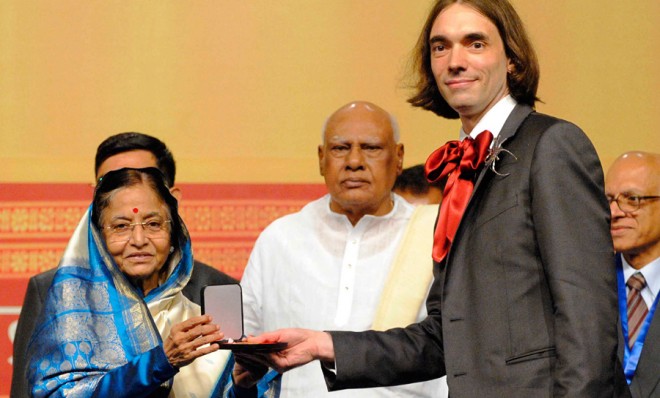How winning awards can drag down productivity
Big prizes can have a big impact, just not in the way you think

A free daily email with the biggest news stories of the day – and the best features from TheWeek.com
You are now subscribed
Your newsletter sign-up was successful
Prestigious awards in academia can be like those carrots dangling in front of horses in cartoons — they drive the best scholars to sprint after a prize that, for most of them, stays just out of reach. The race for recognition produces great work, but what happens when a scholar is actually awarded with a carrot?
New research from Harvard's George J. Borjas and Kirk B. Doran shows that mathematicians who win the biggest prize produce less after receiving it than other contenders who were passed over.
Specifically, researchers looked at the winners of the Fields Medal, the most prestigious prize in mathematics. Awarded once every four years, the medal was most recently awarded to this fella, Cédric Villani, for his work on partial differential equations and mathematical physics. It comes with $15,000, increased job opportunity and job security, and a boatload of prestige.
The Week
Escape your echo chamber. Get the facts behind the news, plus analysis from multiple perspectives.

Sign up for The Week's Free Newsletters
From our morning news briefing to a weekly Good News Newsletter, get the best of The Week delivered directly to your inbox.
From our morning news briefing to a weekly Good News Newsletter, get the best of The Week delivered directly to your inbox.
To study the impact of the prize's intangible riches, the researchers compared the winners' career paths to those of other "brilliant," award-winning mathematicians who were contenders for the medal, but never actually won it. Using archival data from the American Mathematical Society and the Mathematics Genealogy project, they examined a few factors, like the number of papers the two groups went on to publish, the number of citations others gave them, and the number of students they went on to mentor.
What the researchers found: "The productivity profile of the two groups is similar until the year in which a particular mathematician wins the Fields Medal." At that point, the productivity of the winner drops off "noticeably" compared to other contenders. Winners publish fewer studies, write less "important" papers, and mentor fewer rising stars.
Though the findings make intuitive sense — where do you go from the top? — they also seem to contradict past research about the impact recognition has on productivity. For example, research has shown that recognition can spark a dopamine response in the brain that rewards workers and drives them to pursue more praise.
There are a couple reasons why this may not apply to Fields winners. The authors explain that winners experience something economists call the "wealth effect," which refers to how people react when they either come into a lot of money, or for some reason start feeling more wealthy. In this case, the wealth of prestige and job opportunity (because, let's face it, $15,000 is measly for such an influential prize), results in winners spending more time on leisure, and less time on work.
A free daily email with the biggest news stories of the day – and the best features from TheWeek.com
But before we call for putting the kibosh on academic prizes (and recognition in general), note that the researchers found a second outcome: The winners were also more inclined to take intellectual risks — namely, exploring different areas of math, or different fields entirely. Researchers call this "cognitive mobility."
Well, it turns out cognitive mobility is a huge time-suck. Since it takes longer to write a paper on an unfamiliar topic, higher cognitive mobility can translate to lower output. The researchers determined that this factor accounted for about half of the decreased productivity.
In Business Insider, Max Nisen gave a few examples:
French mathematician René Thom won his medal for his earlier work in differential topology. He's perhaps more famous for his role in developing singularity/catastrophe theory years later. David Mumford's initial work was in algebraic geometry. He's now a leader in developing the mathematics of vision and pattern theory. Stephen Smale's Fields Medal came from work in many-dimensional topology. His subsequent work has had a significant impact on physics, biology, and theoretical economics. [Business Insider]
In other words, big rewards may not always spur workers to run harder after more carrots — but it could make them curious about other vegetables.
Carmel Lobello is the business editor at TheWeek.com. Previously, she was an editor at DeathandTaxesMag.com.
-
 Buddhist monks’ US walk for peace
Buddhist monks’ US walk for peaceUnder the Radar Crowds have turned out on the roads from California to Washington and ‘millions are finding hope in their journey’
-
 American universities are losing ground to their foreign counterparts
American universities are losing ground to their foreign counterpartsThe Explainer While Harvard is still near the top, other colleges have slipped
-
 How to navigate dating apps to find ‘the one’
How to navigate dating apps to find ‘the one’The Week Recommends Put an end to endless swiping and make real romantic connections